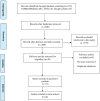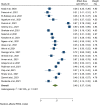COVID-19 vaccine acceptance among health care workers in Africa: A systematic review and meta-analysis
- PMID: 35584110
- PMCID: PMC9116626
- DOI: 10.1371/journal.pone.0268711
COVID-19 vaccine acceptance among health care workers in Africa: A systematic review and meta-analysis
Abstract
Introduction: Coronavirus Disease (COVID-19) vaccine acceptance, and hesitancy amongst Health Care Workers (HCWs) on the African continent have been examined through observational studies. However, there are currently no comprehensive reviews among these cadre of population in Africa. Hence, we aimed to review the acceptance rate and possible reasons for COVID-19 vaccine non-acceptance/hesitancy amongst HCWs in Africa.
Methods: We searched Medline/PubMed, Google Scholar, and Africa Journal Online from January, 2020 to September, 2021. The Newcastle-Ottawa Quality Assessment tool adapted for cross-sectional studies was used to assess the quality of the retrieved studies. DerSimonian and Laird random-effects model was used to pool the COVID-19 vaccine acceptance rate. Sub-group and sensitivity analyses were performed. Reasons for COVID-19 vaccine hesitancy were also systematically analyzed.
Results: Twenty-one (21) studies were found to be eligible for review out of the 513 initial records. The estimated pooled COVID-19 vaccine acceptance rate was 46% [95% CI: 37%-54%]. The pooled estimated COVID-19 vaccine acceptance rate was 37% [95% CI: 27%-47%] in North Africa, 28% [95% CI: 20%-36%] in Central Africa, 48% [CI: 38%-58%] in West Africa, 49% [95% CI: 30%-69%] in East Africa, and 90% [CI: 85%-96%] in Southern Africa. The estimated pooled vaccine acceptance was 48% [95% CI:38%-57%] for healthcare workers, and 34% [95% CI:29%-39%] for the healthcare students. Major drivers and reasons were the side effects of the vaccine, vaccine's safety, efficacy and effectiveness, short duration of the clinical trials, COVID-19 infections, limited information, and social trust.
Conclusion: The data revealed generally low acceptance of the vaccine amongst HCWs across Africa. The side effects of the vaccine, vaccine's safety, efficacy and effectiveness, short duration of the clinical trials, COVID-19 infections, limited information, and social trust were the major reasons for COVID-19 hesitancy in Africa. The misconceptions and barriers to COVID-19 vaccine acceptance amongst HCWs must be addressed as soon as possible in the continent to boost COVID-19 vaccination rates in Africa.
Conflict of interest statement
The authors have declared that no competing interests exist.
Figures
References
-
- Rieg S, von Cube M, Kalbhenn J, Utzolino S, Pernice K, Bechet L, et al. COVID-19 in-hospital mortality and mode of death in a dynamic and non-restricted tertiary care model in Germany. PLoS One [Internet]. 2020;15(11 November):1–16. Available from: doi: 10.1371/journal.pone.0242127 - DOI - PMC - PubMed
Publication types
MeSH terms
Substances
LinkOut - more resources
Full Text Sources
Medical




